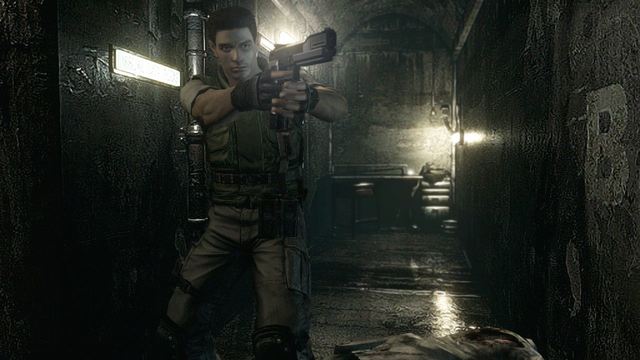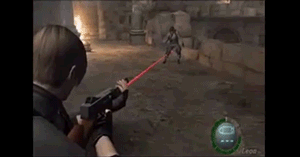Dread. That’s the emotion I felt when I first entered the Spencer estate. Despite having access to a handgun and being the master of unlocking, it dawned upon me that I wasn’t safe.
That used to be a big part of Resident Evil — the feeling of dread and vulnerability. What changed?
The first game starts off with the Raccoon City S.T.A.R.S. alpha team being sent to investigate a series of murders and the disappearance of the S.T.A.R.S. bravo team in the Arklay Mountains.
The Illusion of Control versus always being in control.
The Special Tactics and Rescue Service, an elite special forces division.
Already at the start of the game, you know you’re part of a special forces team. You’re supposed to be trained to handle any situation. You are the big tough guy (or girl!). And you’re not alone — you’ve got your whole squad and you’re all armed. Time to kick some ass.
After being sent to the mountains, the alpha team quickly finds out that the woods are infested with rabid zombie dogs and sees them eat a team member alive. They are forced to run to the relative “safety” of the mansion near by. The mansion is supposed to be your refuge, but you quickly find out it’s more likely to be your coffin.

This is how the first game successfully conveys horror. It sets you up in a situation were you are supposedly in control — and then takes it all away before throwing you into the deep end, showing how vulnerable you really are. In the newer games, this isn’t quite the case. Sure, things are going to hell around you, but you are always in control. It’s not a question of “how am I going to survive the next few hours?” Instead you’re asking, “how many more enemies do I have to kill?”
Resident Evil 4: The game changer.
Things started to become different for the series when Resident Evil 4 was released. People say that Resident Evil 4 (The Father of Modern Resident Evil), despite being an amazing game, was the beginning of the end for truly terrifying Resident Evil titles. I disagree completely.
Resident Evil 4 might not have been the scariest entry in the series, but it did have some of the most horrifying moments — proving that a game could be both tense and terrifying.
The Regenerador enemy is one of the scariest in the series. It feeds on that sense of dread. You can hear them when they’re nearby, but you can’t always see them. And you really don’t want one sneaking up on you.

The atmosphere in many parts of the game was perfectly unnerving. These are things that add up to a chilling experience.
And that is when Resident Evil is at is strongest — when it makes you dread the environments, the enemies, the situation you’re in. When it manages to get under your skin and makes you look over your shoulder in real life.
Replacing horror with tension.
People sometimes say that the new control scheme in RE4 helped to streamline the combat experience and made the game feel more like an action shooter. They say that’s why Resident Evil isn’t scary anymore.
But it wasn’t the new control scheme, despite its emphasis on action. It wasn’t the lack of zombies or the setting. No, it was the fact that you became a walking arsenal of WMDs with weapons for every situation, and action-packed moments became the norm.
Instead of dread, what Resident Evil now focuses on is tension. Resident Evil 6 is the far from scary, but it’s a very tense game. The same goes for RE5 and we start to see it in RE4.
That’s not necessarily a bad thing, but it’s a far cry from the game’s roots as a survival horror.
The problem is that Capcom is ignoring the best part of the horror genre. You can have a tense game, while also making it dreadful and scary.
Tension and horror should not be mutually exclusive.
The first Dead Space title is a perfect example of tension merging with horror. That game is dripping with atmosphere and an overarching feeling of dread. It also has some of the most tense moments in survival horror gaming.

Tension is not a substitute for horror, and until publishers can learn that, we will have to get our horror kicks from games like Outlast, Alien: Isolation and Amnesia — all titles that make you vulnerable and fill you with dread.
Is there hope?
I’d like to believe that Capcom could make a good console Resident Evil again, but their missteps with Resident Evil 6 make me uneasy.
Resident Evil 6 could have benefited from a little less story-cramming. The game has you following many different characters and the story becomes larger than life; it’s only natural the game’s going to feel so action-oriented when so much stuff is happening all the time.
Remember when Resident Evil focused on one or two characters?
In total, RE6 has over 4 hours of cutscenes — way too much for any horror game. The main advantage that horror games have over movies is that you are the one making the decisions and choices, so your experience becomes much more personal. By making a lot of the game’s plot advance through cutscenes, the game might as well have been a movie.
If Capcom can scale it back and in some ways return to the Resident Evil roots, it might be able to make a comeback. The way the story ends in 6 leaves things feeling larger than life, and it might be a bad thing if they continue it that way.
I usually hate it when a series decides to reboot. Most of the time it’s completely unnecessary. But this time, I really think Capcom will have to reinvent Resident Evil, just like the fourth game did.










Published: Nov 27, 2015 09:04 am